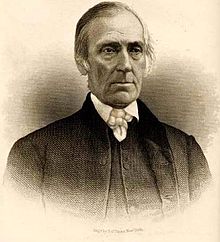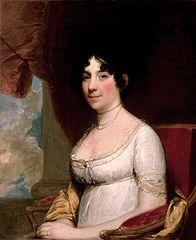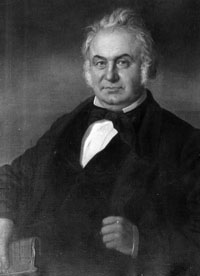- Arthur Forbis (1746-1781) — captain of the Guilford County militia at the Battle of Guilford Courthouse, where he was mortally wounded on 15 March 1781.
- Dolley Payne Todd Madison (1768-1849) — wife of President James Madison, and the 4th First Lady of the United States. Her mother, Mary Cole, a Quaker, married John Payne, a non-Quaker, in 1761. Three years later, he applied and was admitted to the Quaker Monthly Meeting in Hanover County, Virginia, and Dolley Payne was raised in the Quaker faith. She was born in the Guilford area while her family belonged to New Garden Meeting. They had moved to the area in 1765, and returned to Virginia in 1769.
- John Motley Morehead (1796-1866) He is known as “the Father of Modern North Carolina.” Born in Virginia, he moved to Rockingham County NC at the age of two. Morehead graduated from UNC Chapel Hill in 1817. He was a distinguished member of The Dialectic & Philanthropic Societies at UNC. Morehead was a member of the NC House of Commons, 1821, 1826-27, & 1838; and Delegate from NC to the Confederate Provisional Congress, 1861-62. He was the 29th Governor of NC from 1841 to 1845, and the first governor inaugurated in the new State Capitol. During his term in office, Morehead supported the new public school system, the extension of railroad lines, the improvement of rivers and harbors, and the construction of waterways and turnpikes. Morehead is buried in the Old First Presbyterian Church Cemetery in Greensboro.
- Levi Coffin (1798-1877) — a Quaker, businessman, and abolitionist leader nicknamed
 the “President of the Underground Railroad.” Coffin was exposed to and developed an opposition to slavery as a child. He followed his family and immigrated to Indiana from NC in 1826 following a persecution of the Quakers by the slave-holders. In Indiana he became a local business leader as a merchant & farmer. He became a major investor in and director of the Bank of Indiana. His position and wealth allowed him to provide most of the funds necessary to supply food, clothing, & transportation for the Underground Railroad operations in his region. At the urging of friends in the anti-slavery movement, he moved to Cincinnati in 1847 to operate a warehouse selling only goods produced by free labor. Despite considerable progress, the venture was unprofitable and he abandoned the enterprise in 1857. During the period, he continued to assist hundreds of runaway slaves by lodging them in his Ohio home. After the Civil War, Coffin traveled around the Midwest and abroad to France and Great Britain where he was instrumental in forming aid societies to provide food, clothing, funds, and education to the freed slaves.
the “President of the Underground Railroad.” Coffin was exposed to and developed an opposition to slavery as a child. He followed his family and immigrated to Indiana from NC in 1826 following a persecution of the Quakers by the slave-holders. In Indiana he became a local business leader as a merchant & farmer. He became a major investor in and director of the Bank of Indiana. His position and wealth allowed him to provide most of the funds necessary to supply food, clothing, & transportation for the Underground Railroad operations in his region. At the urging of friends in the anti-slavery movement, he moved to Cincinnati in 1847 to operate a warehouse selling only goods produced by free labor. Despite considerable progress, the venture was unprofitable and he abandoned the enterprise in 1857. During the period, he continued to assist hundreds of runaway slaves by lodging them in his Ohio home. After the Civil War, Coffin traveled around the Midwest and abroad to France and Great Britain where he was instrumental in forming aid societies to provide food, clothing, funds, and education to the freed slaves.
- John Adams Gilmer (1805-1868) — also known as John A. Gilmer — of Greensboro. Member of NC state senate, 1846-56; candidate for Governor of NC, 1856; U.S. Representative from NC 5th District, 1857-61; delegate to NC secession convention, 1861; Representative from NC in the Confederate Congress, 1864-65.
- Alfred Moore Scales (1827-1892) —- of Rockingham County, NC. Lawyer; member of North Carolina state legislature; U.S. Representative from North Carolina, 1857-59, 1875-84 (6th District 1857-59, 5th District 1875-84); general in the Confederate Army during the Civil War; Governor of North Carolina, 1885-89.
- Joseph Gurney Cannon (1836-1926) — a powerful United States Congressman who served as the 40th Speaker of the US House of Representatives from 1903 to 1911.
- John Norman Staples (1846-1920) — of Greensboro. Colonel in the Confederate Army during the Civil War; member of NC House of Representatives, 1874-76; delegate to Democratic National Convention from NC, 1876; member of NC Senate 24th District, 1881; Presidential Elector for North Carolina, 1884. Episcopalian.
- James Rufus Gordon (1857-1931) — also known as James R. Gordon — of Jamestown, Guilford County, N.C. Born in Jamestown, Guilford County, N.C., February 23, 1857. Physician; member of NC state house of representatives from Guilford County, 1905-09, 1913. Methodist. Member, Junior Order.
- William Sydney Porter (1862-1910) — a short story writer whose pen name was “O. Henry.” William Sidney Porter was born on September 11, 1862, in Greensboro, North Carolina. His middle name at birth was Sidney; he changed the spelling to Sydney in 1898. His parents were Dr. Algernon Sidney Porter, a physician, and Mary Jane Virginia Swaim Porter. In 1879, he started working in his uncle’s drugstore and in 1881, at the age of nineteen, he was licensed as a pharmacist. At the drugstore, he also showed off his natural artistic talents by sketching the townsfolk. After a failed career in banking, he wrote 381 short stories. He wrote a story a week for over a year for the New York World Sunday Magazine. His wit, characterization, & plot twists were adored by his readers, but often panned by critics. Also see: Greensboro Writer O. Henry
- Edward R. Murrow (1908-1965) — a radio and television journalist for CBS News from the 1930s to 1960s. During WWII his broadcasts from London during the Battle of Britain were well-known. He also played a major role in the downfall of Senator Joe McCarthy.
- Lunsford Richardson Preyer (1919-2001) — also known as L. Richardson Preyer — of Greensboro, Guilford County, N.C. Born in Greensboro, Guilford County, N.C., January 11, 1919. Grandson of Lunsford Richardson (inventor of Vick’s VapoRub and Vick’s Cough Drops). Democrat. Served in U.S. Navy during World War II; lawyer; superior court judge in North Carolina, 1956; U.S. District Judge for the Middle District of North Carolina, 1961-63; candidate for Governor of North Carolina, 1964; delegate to Democratic National Convention from North Carolina, 1964; U.S. Representative from North Carolina 6th District, 1969-81. Presbyterian. Member, Common Cause. The federal building in Greensboro, N.C. was named for him in 1988.
majority of information above from Wikipedia articles


